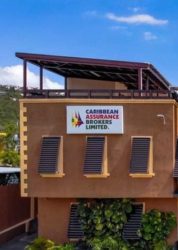In Monday’s forex trading, funds bought by dealers, were US$4 million more than the amount they sold. Authorized dealers bought the equivalent of US$48,682,961 versus US$39,624,611 on Thursday, and sold the equivalent of US$44,817,815 compared to US$33,192,211 on Thursday.
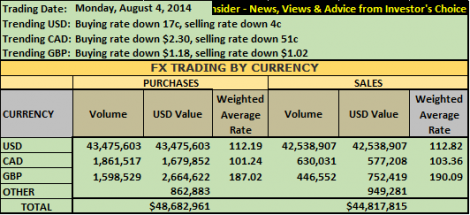 In US dollar trading, dealers bought US$43,475,603 compared to US$33,363,187 on Thursday. The buying rate for the US dollar fell 17 cents to $112.19 and US$42,538,907 was sold versus US$29,758,889 on Thursday, the selling rate declined by 4 cents to $112.82.
In US dollar trading, dealers bought US$43,475,603 compared to US$33,363,187 on Thursday. The buying rate for the US dollar fell 17 cents to $112.19 and US$42,538,907 was sold versus US$29,758,889 on Thursday, the selling rate declined by 4 cents to $112.82.
The Canadian dollar buying rate fell $2.30, to $101.24 with dealers buying C$1,861,517 and selling C$630,031, the rate fell 51 cents to $103.36.
The Pound closed at $187.02, for the purchase of £1,598,529 as the rate dropped $1.18 while only £446,552 was sold, as the rate eased $1.02, to $190.09. Other currencies bought, amounted to the equivalent of US$862,883 while selling was for the equivalent of US$949,281.
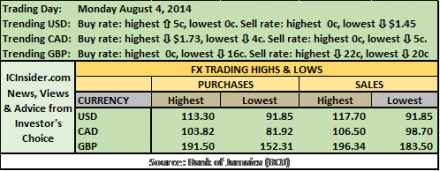 Highs & Lows| The highest rate for buying the US dollar, rose 5 cents to $113.30, the lowest buying, and the highest selling rates remained unchanged at $91.85 and $117.70 respectively, the lowest selling dropped $1.45 to $91.85. The highest buying rate for the Canadian dollar declined $1.73 to $103.82 and the lowest buying rate lost 4 cents to $81.92. The highest selling rate was unchanged at $106.50 and the lowest selling rate was down 5 cents to $98.70. The highest buying rate for the British Pound remained at $191.50, the lowest buying rate declined by 16 cents to $152.31, the highest selling rate dipped 22 cents to $196.34 and lowest selling rate declined 20 cents to $183.50.
Highs & Lows| The highest rate for buying the US dollar, rose 5 cents to $113.30, the lowest buying, and the highest selling rates remained unchanged at $91.85 and $117.70 respectively, the lowest selling dropped $1.45 to $91.85. The highest buying rate for the Canadian dollar declined $1.73 to $103.82 and the lowest buying rate lost 4 cents to $81.92. The highest selling rate was unchanged at $106.50 and the lowest selling rate was down 5 cents to $98.70. The highest buying rate for the British Pound remained at $191.50, the lowest buying rate declined by 16 cents to $152.31, the highest selling rate dipped 22 cents to $196.34 and lowest selling rate declined 20 cents to $183.50.
Archives for August 2014
Jamaican$ gained against all
Jamaican Government revenues short $3.5b
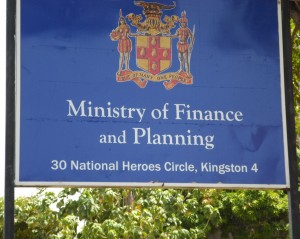 A $2.5 billion shortfall in the collection of company tax and a $2 billion shortfall in the collection of grants, offset by some areas that over performed, resulted in the overall tax take for the first 3 months of the 2014/15 fiscal year to June, falling short of budget by $3.5 billion revenues.
A $2.5 billion shortfall in the collection of company tax and a $2 billion shortfall in the collection of grants, offset by some areas that over performed, resulted in the overall tax take for the first 3 months of the 2014/15 fiscal year to June, falling short of budget by $3.5 billion revenues.
On the expenditure side, reduced payments of $2.3 billion for non-wages and interest and a billion less in the wage bill, coupled with a $3 billion reduced capital spend, helped to cut expenditure by $6.3 billion, leaving the fiscal deficit better off by $2.8 billion.
Revenues came in at $93 billion for the three months and expenditure at $110 billion, for an overall fiscal deficit of $17 billion.
Areas of revenues that were major out performers are, PAYE with $578 million or 3.6 percent, tax on dividends, $100 million or 24 percent, tax on interest, $726 million or 255 percent, special consumption tax on local goods $737 million or 27 percent, education tax, $231 million an increase of 5 percent.
Local GCT fell sort by 5.5 percent amounting to $792 million, GCT on imports fell short by 5 percent or $723 million.
Finance cost shocks JPS
Jamaica Public Service Company profit got a shock for the June quarter when a 21 percent increase in finance cost drove total cost for the quarter in this area to US$18 million from US$15 million in 2013.
 For the six months to June, finance cost was flat with the prior year at nearly US$33 million for each period. The company, the sole distributor of power to end users in the country, reported only US$1.7 million in after tax profit for the quarter and US$8.9 for the six months to June. In 2013 the second quarter profit was US$1.6 million and the six months US$2.4 million.
For the six months to June, finance cost was flat with the prior year at nearly US$33 million for each period. The company, the sole distributor of power to end users in the country, reported only US$1.7 million in after tax profit for the quarter and US$8.9 for the six months to June. In 2013 the second quarter profit was US$1.6 million and the six months US$2.4 million.
Revenues generated in the periods to produce those results are US$270 million versus $268 million in 2013 for the quarter and US$533 million in the six months and for 2013, US$539 million. Although the revenues varied, a more important measure is gross profit which are net of the impact of fuel and the charge for the purchase of power from private power plants. The sales net of fuel and the purchases of power came out at US$67.2 million in the June quarter compared with US$62.9 million in 2013 and US$137 million for the six months and US$133.5 in 2013. The return on equity is only around 5.4 percent for the year well below the allowed rate of 16 percent by the regulators, but the impact of devaluation charge due to the accounting in US dollar rather than Jamaican dollars negatively affected the returns.
Ironically, while JPS records its financials in United Sates dollars, the company suffered a devaluation loss of US$7.4 million in the quarter and US$12.5 million for the six months. Without the foreign exchange losses return on equity would have been much greater than the above stated figure.
“JPS currently has approximately 606,654 customers who are served by a workforce of approximately 1,690 employees. The Company owns and operates: 4 power stations, 9 hydroelectric plants, 43 substations and approximately 14,000 kilometres of distribution and transmission lines,” the company stated in its annual report for 2013.
JPS That has equity of US$337 million also has debt of US$418 million as of March.
Little change in employed in March
Jamaica’s unemployment rate drops to 13.6 percent in March compared to March last year, according to data released by the Statistical institute of Jamaica (STATIN), but the rate is worse than it was in December last year. 
The unemployment rate in December was 13.4 percent according to Statin data for that period. There were 1,133,000 employed persons in March this year, which was 25,700 more than the 1,107,300 recorded in April 2013, the Statin labour report said, the March 2014 numbers are only a marginally better than the 1,130,500 persons employed in December last yea.
According to the Statin data, the country’s labour force in March was 1.311 billion persons down from 1.322 billion in Match 2013 as 11,300 persons exited the work force over the one year period, the report stated. At the same time 25,700 persons found work across a wide cross section of the work force. The number of persons classified as outside the Labour Force was 769,900 In March 2014 and an increase of 16,200 over 2013.
Who got jobs?|The Occupation group ‘Elementary Occupations’ increased by 18,200 persons or 12.8 percent, moving from 141,700 in April 2013 to 159,900 in March and the group, ‘Professionals, Senior Officials and Technicians’, increased from 241,900 persons in March 2013 to 251,700 persons (4.1 percent). The group ‘Craft and Related Trades Workers’ had the largest decline for the period, moving from 139,300 in March 2013 to 134,700 in 2014, resulting in a decline of 4,600 (3.3 percent) persons.
The number of persons employed in the ‘Hotels & Restaurants Services’ increased by 9,100 (13.4 percent) persons while the group ‘Transport, Storage and Communication’ increased by 7,300 (10.5 percent) persons.
Main indices jump as more stocks fall than gain
Monday’s trading was moderate on the Jamaica Stock Exchange with the prices of 3 stocks rising and 6 declined. Overall, 18 securities changed hands, resulting in 1,246,051 shares trading, valued at $23,324,871. One stock closed at a new 52 weeks’ low.
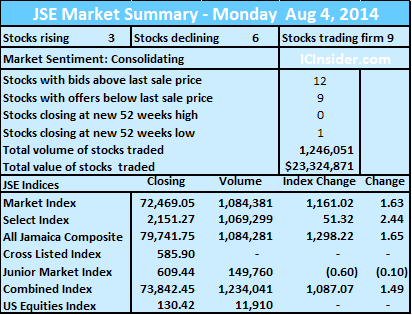 Main Market| The JSE Market Index rose 1,161.02 points to 72,469.05 and the JSE All Jamaican Composite index gained 1,298.22 points to close at 79,741.75
Main Market| The JSE Market Index rose 1,161.02 points to 72,469.05 and the JSE All Jamaican Composite index gained 1,298.22 points to close at 79,741.75
Gains| Stocks with gains, along with the volume and last traded prices at the end of trading in the main market, are Jamaica Money Market Brokers with 6,000 ordinary shares and gained 4 cents to $7, Sagicor Group 10,193 units in gaining 6 cents to $9.26 and Scotia Group with 1,019,462 units, closed 50 higher at $19.50.
Firm| The stocks with volume and last traded prices in the main market to close without a change in price, are Grace Kennedy with 14,696 shares to close at $56.50, Jamaica Broilers 3,600 shares closed at $4.57, Jamaica Producers with only 900 shares at $17.50, Proven Investments with 11,910 US dollar ordinary share, closed at 18 US cents and Seprod 100 units at $10.50.
Declines| The stocks with losses, volume and last traded prices at the end of trading in the main market, are Caribbean Cement with 2,200 shares, in losing 10 cents to $2.50, Carreras 2,299 shares in closing 20 cents lower at $34, Gleaner with 12,800 shares while losing 2 cents to $1.10, National Commercial Bank 10,442 shares traded with a 50 cents loss at $18.40 and Scotia Investments had only 1,589 units trading while the price shed $1 to $20, a new 52 weeks’ low.
Preference| In the preference shares segment, Eppley 9.5% preference share, traded 84,500 units at $6.10 and Jamaica Money Market Brokers 8.75% preference share, had only 100 units changing hands at $3.
Junior Market| The JSE Junior Market Index declined by 0.60 points to close at 609.44 as only 3 stocks traded, with no advancing stock and one declining.
Gains| No junior market stock gained in Mondays trading.
Firm Trades| Stocks in the junior market that traded with the closing price of the previous trading day, are Lasco Distributors with 3,000 shares, to close at $1.01 and Lasco Financial 22,260 shares to close at 90 cents.
Declines| General Accident traded 40,000 units at a cent lower, at $1.35 and was the only junior market stock to decline.
IC bid-offer Indicator| At the end of trading the Investor’s Choice bid-offer indicator had 12 stocks with bids higher than their last selling prices and 9 stocks with offers that were lower.
Declines dominate post emancipation trades
Trading on the Trinidad Stock Exchange on Monday, the trading day after the market closed for Emancipation day, was low with 13 securities changing hands of which only 1 advanced, 6 declined and 6 traded firm, with 59,661 stocks changing hands at a value of $1,557,124.
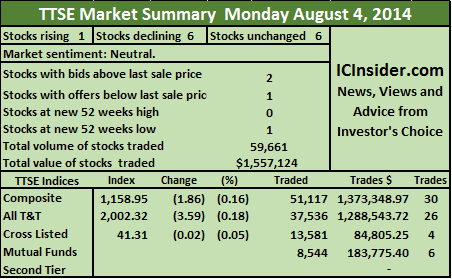 The Composite Index lost 1.86 points to close at 1,158.95, the All T&T Index fell by 3.59 points to close at 2,002.32 and the Cross Listed Index fell 0.02 points to end at 41.31.
The Composite Index lost 1.86 points to close at 1,158.95, the All T&T Index fell by 3.59 points to close at 2,002.32 and the Cross Listed Index fell 0.02 points to end at 41.31.
Gains| Stocks increasing in price at the close, are National Flour Mills in contributing 9,834 units with a value of $10,326 and gained 5 cents, to end at $1.05.
Declines| The stocks declining at the end of trading, are Clico Investment Fund that traded 8,544 units valued at $183,775, the price declined by 10 cents to end at $21.60, First Citizens traded 2,165 units to close down by 66 cents at $36, Prestige Holdings shed a cent, while trading 2,000 units at $9.40, Republic Bank added 7,666 shares valued at $935,142, but the price fell by a cent to $121.99, Sagicor Financial Corporation with 12,500 shares changing hands for a value of $83,075, closed at $6.63, down 3 cents, Scotiabank traded 771 units but the price slid 73 cents, to close at a new 52 weeks low of $65.99.
Firm Trades| Stocks closing with prices unchanged at the end of trading are Agostini’s with 500 units, to close at $17.45, Angostura Holdings with 2,000 shares ended at $12.75, Grace Kennedy traded only 248 units at $3.45, Guardian Holdings with 11,000 shares traded for $157,300, ended at $14.30, while, National Commercial Bank with 833 shares, closed at $1.05 and Trinidad Cement closed at $1.90 while trading 1,600 shares.
IC bid-offer Indicator| At the end of trading the Investor’s Choice bid-offer indicator had 3 stocks with the bids higher than their last selling price and no stock closed with an offer that was lower.
Strong growth still evident at Access
The public may get the impression that the dispute at the directorship level, may be affecting Access Financial Services badly, that is not showing in the profit numbers to date. 
On the surface, it may appear that a profit increase of only 13 percent, in the June quarter could be a by-product of the dispute, considering the robust 30 percent increase in profit in the March quarter, but that would be a wrong conclusion. Revenues grew 35 percent in the second quarter, to reach $267 million. Revenues grew from of $198 million for June 2013 and from $254 million in the 2014 March quarter. For the six months to June, revenues climbed 40 percent to $521 million up from $371 million in 2013, continuing its strong growth trajectory since the shares were listed in 2010. The revenue growth, was fueled primarily from interest on loans that climbed to $473 million from $347 million in 2013.
A $50 million increased provision for bad loans to $75 million, for the June quarter versus last year June quarter, was the major reason for the slower profit increase, in the quarter.
Access is still set to deliver around $1.50 earnings per share, for the current year. With equity of $750 million, the company is likely to enjoy a very strong 50 percent return on equity for the current year. The stock last traded at $8.97 but had a bid of $9.15, to buy a small quantity of the company’s stock. The stock is tightly held and is difficult to get at times. The company just declared a dividend of 36.5 cents per share payable to shareholders on September 1st.
Loans on the books at June is at $1.1 billion, a major jump from the $776 million at June 2013. Total borrowed funds used in the financing of the business, amount to $542 million compared to $360 million in June last year, with cash at $87 million.
Argentina’s recent debt default -consequencies
The government of Argentina has defaulted its public debt – yet again. It is bound to have unfavourable consequences for the people of Argentina, who are likely to see their currency lose value, and many will lose their jobs.
“The current political situation in Argentina is also looking positive: Mrs. Kirchner’s, the country’s president’s popularity is at an all-time low, she can’t be re-elected, and doesn’t have the power to nominate her successor” Steve Rosberg, an Argentinian resident stated. Rosberg goes on to state that “as a result, and as a reaction of her leftist rhetoric and the current crisis, the four most probable candidates – those who have real chances of being elected – are all market friendly, and of a centre to centre-right inclination. They are all likely to make the necessary reforms to get out of this default, and to pursue foreign investment. We believe they don’t really have a choice, except in a matter of degrees. It has been a slow and painful decade with the Kirchners, who are leaving the country pretty much in the same condition they found it in 2003. Now, like then, there will be great opportunities to invest in Argentina”.
Grace’s 21% profit gain obscures pressures
Grace reports a 21 percent increase in profit for the six months to June, this year, but the net result obscures pressures in many of the divisions within the sprawling group and mainly a reduction in the tax rate to 25 percent from 30 percent last year beefed up the bottom-line.
 A 15 percent increase in second quarter revenues bettered the 12 percent increase in the first quarter this year, helping to produce pretax profit of $1.3 billion in the second quarter for an increase of 8.6 percent over 2013, down from 12 percent increase, in the first quarter. For the six months, pretax profit amounted to $2.58 billion versus $2.33 billion in 2013. Profit after tax is up 20 percent for the June quarter to $845 million compared with $703 million in 2013, and for the six months, $1.68 billion or 21 percent ahead of 2013. Earnings per share of $5.07 for the half year, seems set to end up around $11 per share for the year, from ongoing earnings.
A 15 percent increase in second quarter revenues bettered the 12 percent increase in the first quarter this year, helping to produce pretax profit of $1.3 billion in the second quarter for an increase of 8.6 percent over 2013, down from 12 percent increase, in the first quarter. For the six months, pretax profit amounted to $2.58 billion versus $2.33 billion in 2013. Profit after tax is up 20 percent for the June quarter to $845 million compared with $703 million in 2013, and for the six months, $1.68 billion or 21 percent ahead of 2013. Earnings per share of $5.07 for the half year, seems set to end up around $11 per share for the year, from ongoing earnings.
Operating profit| Operating profit margin before other income slipped in the latest quarter to 4.34 percent down from 4.97 percent in 2013, for the year to date its 4.5 percent, the same as in the previous year. The reduced margin in the second quarter may not seem like much but it helped in ensuring that operating profit before other income was only up less than 1 percent compared with the revenue increase of 12 percent.
Return on equity is working out at around 11 percent, which is not high by Jamaican standards, and is indicative that management has a lot of work to do, to get it up to more acceptable levels.
Revenues| For the second quarter, revenues came in at $19.7 billion, better than the $18.8 billion generated in the first quarter. For the year to date revenues are up to $38.5 billion or 14 percent over that of 2013. The bulk of the revenue increase came from the Food trading division with a 16.2 percent increase and money services of 18.7 percent, with the other divisions enjoying moderate increases at best but with most being flat.
Balance sheet| Grace’s balance sheet shrunk, with the sale of the investment arm to Proven Investments, they now boast total assets of $93.5 billion, down from $108.6 billion at December last year. Subsequent to the quarter, Grace announced the acquisition of a new subsidiary in the USA, La Fe Foods with revenues of US$80 million per annum or J$9 billion.
The company’s stock last traded at $56.50, at around 5 times earnings, providing upside potential when the local stock market gets going, for it to deliver decent gains for patient investors.
Cost jumps sharply dents Republic Bank’s profit
 Republic Bank’s assets grew by 6 percent for the year to June fueled by loans amounting to $26.6 billion that grew by 8.5 percent to over the same period.
Republic Bank’s assets grew by 6 percent for the year to June fueled by loans amounting to $26.6 billion that grew by 8.5 percent to over the same period.
The growth in assets and loans did not translate to increased profit. In fact profit was only saved from falling, by a turnaround in the result of associated companies moving from a loss of $74 million to a small profit of $7 million in the quarter and from a loss of $70 million in the nine months to a profit of $34 million. Profit before associated company results is down from $489 million to $426 million for the latest quarter and for the nine months, $1.22 billion from $1.27 billion. Net profit due to the bank’s shareholders is $308 million in the June quarter, compared with $305 million in 2013 and for the nine months, $869 million compared with $858 million. The results compare favorably with Trinidad’s Scotia Bank that suffered a 17 percent decline in profits for the 3 months to April and 7.5 percent for the six months.
Expenses| Operating expenses rose 18 percent, to reach $454 million for the quarter and 24.5 percent for the nine months, well ahead of the gain in revenues which is flat in the latest quarter but up 10 percent for the nine months. Interestingly, operating cost increased by 6.6 percent in the first quarter of the financial year. In the March quarter, Republic made a provision of $185 million writing down the value of goodwill on its investments in Barbados, resulting in a 45 percent jump in in operating expenses for the quarter. Countering the write off was a gain of $210 million, from sale of Visa Shares in the March quarter. What is clear is that results for 2014 will be around the same level as in 2013 of $1.297 billion or $7.30 per share. Republic Bank’s stock last traded at $122 each at a PE of 17.8.




